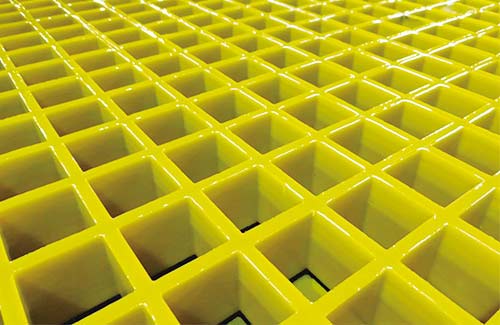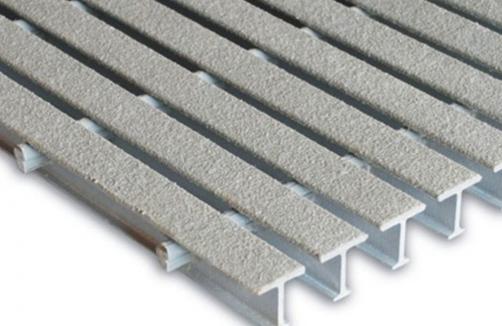Fiber Reinforced Plastic (FRP) grating, also known as fiberglass grating, has become a popular choice in various industrial applications, particularly in the chemical industry. This material offers a unique combination of strength, durability, and resistance to harsh environments, making it an ideal solution for many challenging conditions. This article will explore the properties of FRP grating, its advantages, and its wide-ranging applications in the chemical industry.
Properties of FRP Grating
FRP grating is made from a composite material consisting of resin and glass fibers. The key properties that make FRP grating suitable for the chemical industry include:
- High Strength-to-Weight Ratio:
– FRP grating is significantly lighter than traditional materials like steel or concrete, yet it maintains high structural integrity. This makes it easier to handle, install, and transport, reducing labor costs and installation time.
- Corrosion Resistance:
– One of the most significant advantages of FRP grating is its excellent resistance to corrosion. Unlike metal gratings, which can rust and deteriorate in corrosive environments, FRP grating remains stable and durable even when exposed to aggressive chemicals and acids.
- Chemical Resistance:
– FRP grating is highly resistant to a wide range of chemicals, including acids, alkalis, solvents, and salts. This property makes it an ideal choice for environments where exposure to these substances is common.
- Non-Conductive:
– FRP grating does not conduct electricity, making it safe for use in areas with electrical hazards. This is particularly important in the chemical industry, where electrical safety is a critical concern.
- Fire Resistance:
– Many FRP grating products are designed to meet fire safety standards, offering good flame retardant properties. This ensures that the material can withstand high temperatures and reduce the risk of fire spread.
- Low Maintenance:
– Due to its non-corrosive nature, FRP grating requires minimal maintenance. It does not need regular painting or surface treatments, which can save significant costs over the long term.
- Slip Resistance:
– FRP grating can be manufactured with a slip-resistant surface, providing better traction and reducing the risk of slips and falls. This is especially important in wet or oily environments.
- UV Resistance:
– FRP grating is resistant to ultraviolet (UV) radiation, ensuring that it does not degrade or lose its color when exposed to sunlight. This makes it suitable for both indoor and outdoor applications.
- Customizability:
– FRP grating can be customized to meet specific requirements, including different sizes, shapes, and colors. This flexibility allows for tailored solutions that fit the needs of various applications.
Applications in the Chemical Industry
The chemical industry is one of the most demanding sectors, with harsh operating conditions and stringent safety requirements. FRP grating’s unique properties make it an ideal material for a wide range of applications in this industry. Here are some of the key areas where FRP grating is commonly used:
- Walkways and Platforms:
– In chemical plants, walkways and platforms are essential for safe access to equipment and machinery. FRP grating provides a durable, non-slip surface that can withstand the corrosive environment and heavy foot traffic. Its lightweight nature also makes it easy to install and maintain.
- Staircases and Ladders:
– Staircases and ladders in chemical facilities must be safe and reliable. FRP grating can be used to construct these structures, providing a non-slip, corrosion-resistant, and low-maintenance solution. The material’s strength and durability ensure that these structures remain safe and functional for years.
- Flooring and Drainage Systems:
– Chemical plants often have areas with high levels of moisture, chemicals, and other corrosive substances. FRP grating can be used as flooring in these areas, providing a durable and slip-resistant surface. Additionally, FRP grating can be integrated into drainage systems to facilitate the removal of liquids and prevent pooling.
- Tank and Vessel Supports:
– Storage tanks and vessels in the chemical industry need robust supports to ensure their stability and safety. FRP grating can be used to create support structures that are resistant to corrosion and can handle the weight and stress of the tanks and vessels.
- Safety Barriers and Guardrails:
– Safety barriers and guardrails are crucial for protecting workers and preventing accidents. FRP grating can be used to construct these safety features, providing a strong, durable, and corrosion-resistant solution. The material’s non-conductive nature also adds an extra layer of safety in areas with electrical hazards.
- Maintenance Platforms and Access Structures:
– Maintenance platforms and access structures are essential for performing routine maintenance and repairs on equipment. FRP grating can be used to build these structures, providing a safe and reliable platform for workers. The material’s lightweight nature makes it easy to move and reconfigure as needed.
- Cooling Towers and Water Treatment Facilities:
– Cooling towers and water treatment facilities in chemical plants require durable and corrosion-resistant materials. FRP grating can be used in these applications, providing a long-lasting solution that can withstand the harsh conditions and resist corrosion.
- Pipe Supports and Insulation:
– Pipes in chemical plants often carry corrosive and high-temperature fluids. FRP grating can be used to create pipe supports and insulation, providing a durable and corrosion-resistant solution. The material’s thermal insulation properties also help to maintain the temperature of the fluids.
- Storage and Handling Areas:
– Storage and handling areas in chemical plants are subject to high levels of wear and tear. FRP grating can be used to create durable and slip-resistant surfaces in these areas, ensuring the safety of workers and the integrity of the stored materials.
- Environmental Control and Waste Management:
– Environmental control and waste management are critical aspects of the chemical industry. FRP grating can be used in containment areas, waste storage, and other environmental control systems, providing a durable and corrosion-resistant solution that meets regulatory requirements.
Advantages of Using FRP Grating in the Chemical Industry
The use of FRP grating in the chemical industry offers several key advantages:
- Enhanced Safety:
– The non-slip, non-conductive, and fire-resistant properties of FRP grating contribute to a safer working environment. This reduces the risk of accidents and injuries, improving overall workplace safety.
- Cost-Effective:
– While the initial cost of FRP grating may be higher than some traditional materials, its long lifespan, low maintenance requirements, and reduced replacement costs make it a cost-effective solution in the long run.
- Durability and Longevity:
– FRP grating’s resistance to corrosion, chemicals, and UV radiation ensures that it remains functional and structurally sound for many years, reducing the need for frequent replacements.
- Ease of Installation:
– The lightweight nature of FRP grating makes it easy to handle and install, reducing labor costs and installation time. This is particularly beneficial in large-scale projects where efficiency is crucial.
- Environmental Benefits:
– FRP grating is a more environmentally friendly option compared to traditional materials. It is recyclable and has a lower carbon footprint, contributing to sustainability efforts in the chemical industry.
Conclusion
FRP grating is a versatile and durable material that offers numerous advantages in the chemical industry. Its high strength-to-weight ratio, corrosion resistance, and chemical resistance make it an ideal solution for a wide range of applications, from walkways and platforms to tank supports and environmental control systems. By leveraging the unique properties of FRP grating, chemical plants can enhance safety, reduce maintenance costs, and improve overall operational efficiency. As the demand for sustainable and high-performance materials continues to grow, FRP grating is poised to play an increasingly important role in the future of the chemical industry.







